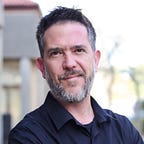Just a few hours after Eusebius McKaiser posted a recommendation to his social media networks, encouraging everyone to listen to Musa Motha, we learn that he has died at the age of 45.
His death was sudden, with no forewarning, and it was apparently an epileptic seizure that took him down. My deepest condolences to Nduduzo, and of course also all the other members of his intimate circle, that I never got to meet.
He was a friend. I’d say a close friend, even though we only spoke when things cropped up that were mutually animating. We had plans to write a book together, and had often engaged in public debate on stage or radio. I don’t capture all interviews and podcasts, but a search for his name on the relevant page says that there were at least 27 instances of us sparring on some topic.
The sessions were often a little performative, in that we’d usually have discussed the topic in advance, and then proceeded to engage in a debate premised on broad agreement, but — crucially, and at his insistence — that still understood the value to public discourse of demonstrating what it sounds like to have a reasonable disagreement with other people.
Whether you liked him or not (and yes, he was opinionated, somewhat arrogant, and sometimes dismissive in the manner of his rejection of arguments for sacred cow topics) the rare and exceptionally valuable example he offered was in how he consistently encouraged and foregrounded ideas, and argument, over conclusions.
That is rare — for humans, as a start, but more so for public broadcasters, who are all fully aware that their perceived value is inversely proportionate to the size of their audience, and that said audience mostly wants to freak out about something rather than entertain the idea of being wrong.
Facebook friends of his — and of course those who have had a meal or whatever with him — would be familiar with his tendency to not only frame the terms of any debate (and this was often an example of the arrogance mentioned above), but then to follow through by demanding that his interlocutors took the conversation as seriously as he was doing.
You don’t need to agree with someone to recognise the value of role-playing, teaching, and celebrating argument and rhetoric. It helps to agree with them, of course, which is part of the problem, and the sort of problem he kept trying to highlight to listeners and readers.
There are plenty of memories, and our conversations were always entertaining (to us, at least). I remember things like reminding him it was time to take an ad break, because we were riffing so much that he forgot to watch the clock. Meanwhile, Mario (in the Cape Town studio, with Eusebius in Johannesburg) was trying to get people to make the point to him with little success, so it seemed simpler just to tell him on air.
The other thing that jumps out to me was when we appeared on stage at a strange thing about religion, where he and I spent a few hours before the event arguing about which of us was an atheist, and which one an agnostic. He kept bringing up some quibble about what we debated that night for years thereafter, so I think I changed his mind.
I’ll miss him, and all of us should, because it often seems that the number of voices and platforms that emphasise reasonable and evidence-led discussion is pretty indistinguishable from zero at this point.
Yes, that’s a cynical and immediate reaction. It’s just that he tried, and few others seem to be doing so. This includes me, too much of the time. But he seemed to have more enthusiasm and determination than many of us manage, and maybe we can belatedly learn a lesson from his example.
Farewell, Eusebius (to give you your full Brazilian, self-aggrandising name).
